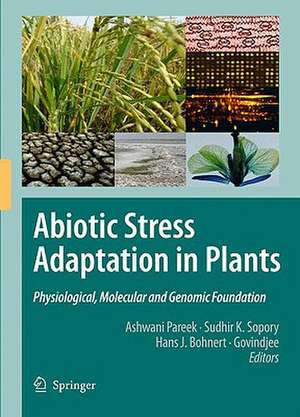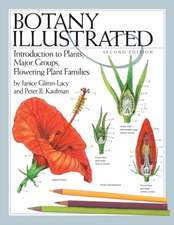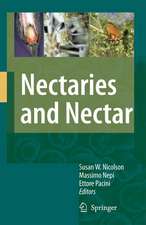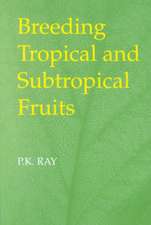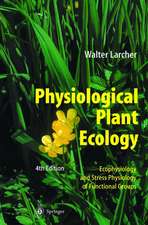Abiotic Stress Adaptation in Plants: Physiological, Molecular and Genomic Foundation
Editat de Ashwani Pareek, S.K. Sopory, Hans J. Bohnert, Govindjeeen Limba Engleză Hardback – 4 feb 2010
Toate formatele și edițiile
| Toate formatele și edițiile | Preț | Express |
|---|---|---|
| Paperback (1) | 1081.74 lei 38-44 zile | |
| SPRINGER NETHERLANDS – 2 noi 2014 | 1081.74 lei 38-44 zile | |
| Hardback (1) | 1113.56 lei 38-44 zile | |
| SPRINGER NETHERLANDS – 4 feb 2010 | 1113.56 lei 38-44 zile |
Preț: 1113.56 lei
Preț vechi: 1465.21 lei
-24% Nou
Puncte Express: 1670
Preț estimativ în valută:
213.15€ • 231.60$ • 179.16£
213.15€ • 231.60$ • 179.16£
Carte tipărită la comandă
Livrare economică 17-23 aprilie
Preluare comenzi: 021 569.72.76
Specificații
ISBN-13: 9789048131112
ISBN-10: 9048131111
Pagini: 568
Ilustrații: XXVII, 526 p.
Dimensiuni: 193 x 260 x 36 mm
Greutate: 1.72 kg
Ediția:2010
Editura: SPRINGER NETHERLANDS
Colecția Springer
Locul publicării:Dordrecht, Netherlands
ISBN-10: 9048131111
Pagini: 568
Ilustrații: XXVII, 526 p.
Dimensiuni: 193 x 260 x 36 mm
Greutate: 1.72 kg
Ediția:2010
Editura: SPRINGER NETHERLANDS
Colecția Springer
Locul publicării:Dordrecht, Netherlands
Public țintă
ResearchCuprins
Stress Perception and Signal Transduction.- Abiotic Tolerance and Crop Improvement.- Sensors and Signal Transducers of Environmental Stress in Cyanobacteria.- Stress Signaling I: The Role of Abscisic Acid (ABA).- Stress Signaling II: Calcium Sensing and Signaling.- Stress Signaling III: Reactive Oxygen Species (ROS).- A Biotic or Abiotic Stress?.- Protein Kinases and Phosphatases for Stress Signal Transduction in Plants.- Nitrogen Source Influences Root to Shoot Signaling Under Drought.- Stress Regulation of Gene Expression.- Abiotic Stress Responses: Complexities in Gene Expression.- Promoters and Transcription Factors in Abiotic Stress-Responsive Gene Expression.- Epigenetic Regulation: Chromatin Modeling and Small RNAs.- Physiology and Metabolism.- Ion Homeostasis.- Glutathione Homeostasis: Crucial for Abiotic Stress Tolerance in Plants.- Water Balance and the Regulation of Stomatal Movements.- Responses to Macronutrient Deprivation.- Osmolyte Regulation in Abiotic Stress.- Programmed Cell Death in Plants.- Overcoming Stress.- Varietal Improvement for Abiotic Stress Tolerance in Crop Plants: Special Reference to Salinity in Rice.- Transgenic Approaches.- Marker Assisted Breeding.- Stress, Mutators, Mutations and Stress Resistance.- Systems Biology of Abiotic Stress: The Elephant and the Blind Men.- Global Climate Change, Stress and Plant Productivity.
Recenzii
From the reviews:
“The book focuses on the ‘physiological, molecular, and genomic’ components of the problems and emphasizes various aspects of overcoming stress through breeding, transgenics, and the identification of markers associated with plant responses to stress. … The quality of the 23 chapters is very high, and they include much very current information from some of the top practitioners in the field. Summing Up: Recommended. Academic libraries serving upper-division undergraduates and above.” (W. Loescher, Choice, Vol. 48 (4), December, 2010)
“This book serves as a complete package on the basics and applications for abiotic stress response pathways in plants’. Indeed, at over 520 pages, with 23 predominantly multi-author chapters arranged in four parts, it is a considerable compendium of information and references … . The book is aimed at ‘late undergraduate through to beginning researchers’ in many areas of science and technology. … it is most suited to libraries, where it should find readers and will be useful.” (David Lawlor, Annals of Botany, Vol. 107 (4), 2011)
“The book is an important and timely addition in view of the frightening global climate change ‘issues and concerns’. … we would like to congratulate the editors for bringing out this vitally useful volume. … the book is informative and innovative. Researchers, teachers, graduate students and advanced undergraduate students would benefit from it. We recommended it to all those interested in plants and microbes, and their biology. … We agree that this is an exciting addition in the field.” (Prasanna Mohanty, S. Rajagopal and N. Raghuram, Current Science, Vol. 99 (9), November, 2010)
“The book presents a standard monograph in which individual chapters are written by different authors. The book is divided into four parts and contains altogether 23 chapters. … the large amount of information contained in this book should be of interest for plant physiologists, stress physiologists, and molecular plant biologists, both researchers and students.” (J. Nauš, Photosynthetica, Vol. 48 (3), 2010)
“This 500+ page book is a timely and comprehensive survey of plant responses to environmental stress, encompassing together 23 chapters covering a wide range of highly relevant topics dealing with abiotic stress in plants. … This is a collection of state-of-the-art reviews useful for researchers, academics, and students who are at an advanced stage of study. … I strongly recommend this book to all the libraries of the universities as well as research institutions that deal with the study of plant biology and plant sciences.” (Maitrayee Bhattacharyya-Pakrasi, Photosynthesis Research, Vol. 108, 2011)
“The book focuses on the ‘physiological, molecular, and genomic’ components of the problems and emphasizes various aspects of overcoming stress through breeding, transgenics, and the identification of markers associated with plant responses to stress. … The quality of the 23 chapters is very high, and they include much very current information from some of the top practitioners in the field. Summing Up: Recommended. Academic libraries serving upper-division undergraduates and above.” (W. Loescher, Choice, Vol. 48 (4), December, 2010)
“This book serves as a complete package on the basics and applications for abiotic stress response pathways in plants’. Indeed, at over 520 pages, with 23 predominantly multi-author chapters arranged in four parts, it is a considerable compendium of information and references … . The book is aimed at ‘late undergraduate through to beginning researchers’ in many areas of science and technology. … it is most suited to libraries, where it should find readers and will be useful.” (David Lawlor, Annals of Botany, Vol. 107 (4), 2011)
“The book is an important and timely addition in view of the frightening global climate change ‘issues and concerns’. … we would like to congratulate the editors for bringing out this vitally useful volume. … the book is informative and innovative. Researchers, teachers, graduate students and advanced undergraduate students would benefit from it. We recommended it to all those interested in plants and microbes, and their biology. … We agree that this is an exciting addition in the field.” (Prasanna Mohanty, S. Rajagopal and N. Raghuram, Current Science, Vol. 99 (9), November, 2010)
“The book presents a standard monograph in which individual chapters are written by different authors. The book is divided into four parts and contains altogether 23 chapters. … the large amount of information contained in this book should be of interest for plant physiologists, stress physiologists, and molecular plant biologists, both researchers and students.” (J. Nauš, Photosynthetica, Vol. 48 (3), 2010)
“This 500+ page book is a timely and comprehensive survey of plant responses to environmental stress, encompassing together 23 chapters covering a wide range of highly relevant topics dealing with abiotic stress in plants. … This is a collection of state-of-the-art reviews useful for researchers, academics, and students who are at an advanced stage of study. … I strongly recommend this book to all the libraries of the universities as well as research institutions that deal with the study of plant biology and plant sciences.” (Maitrayee Bhattacharyya-Pakrasi, Photosynthesis Research, Vol. 108, 2011)
Textul de pe ultima copertă
Environmental insults such as extremes of temperature, extremes of water status as well as deteriorating soil conditions pose major threats to agriculture and food security. Employing contemporary tools and techniques from all branches of science, attempts are being made worldwide to understand how plants respond to abiotic stresses with the aim to help manipulate plant performance that will be better suited to withstand these stresses. The present book on abiotic stress is an attempt to search for possible answers to several basic questions related to plant responses towards abiotic stresses. This book presents a holistic view of the general principles of stress perception, signal transduction and regulation of gene expression. Further, chapters in this book analyze not only model systems but extrapolate interpretations obtained from models to crops. Lastly, we discuss how stress-tolerant crop or model plants have been or are being raised through plant breeding and genetic engineering approaches. Twenty three chapters, written by international authorities, integrate molecular details with overall plant structure and physiology, in a text-book style, including key references. This book serves as a complete package on the basics and applications for abiotic stress response sensing and genetic and metabolic response pathways in plants; it is designed for use by advanced undergraduate students, graduate students and beginning researchers in the area of stress biology, plant molecular biology, plant physiology, agriculture, biochemistry and environmental biology.
Caracteristici
Presents a holistic view of the general principles of stress perception, signal transduction and regulation of gene expression Provides a current view of the problems related to the degeneration of agro-ecological environments and an apparently changing climate Emphasizes how plant species cope with environmental insults Discusses mechanisms and strategies for adapting crop species to environmental stresses Serves as a complete package for students, researchers and scientists with an interest in abiotic stress response sensing and genetic and metabolic response pathways in plants
